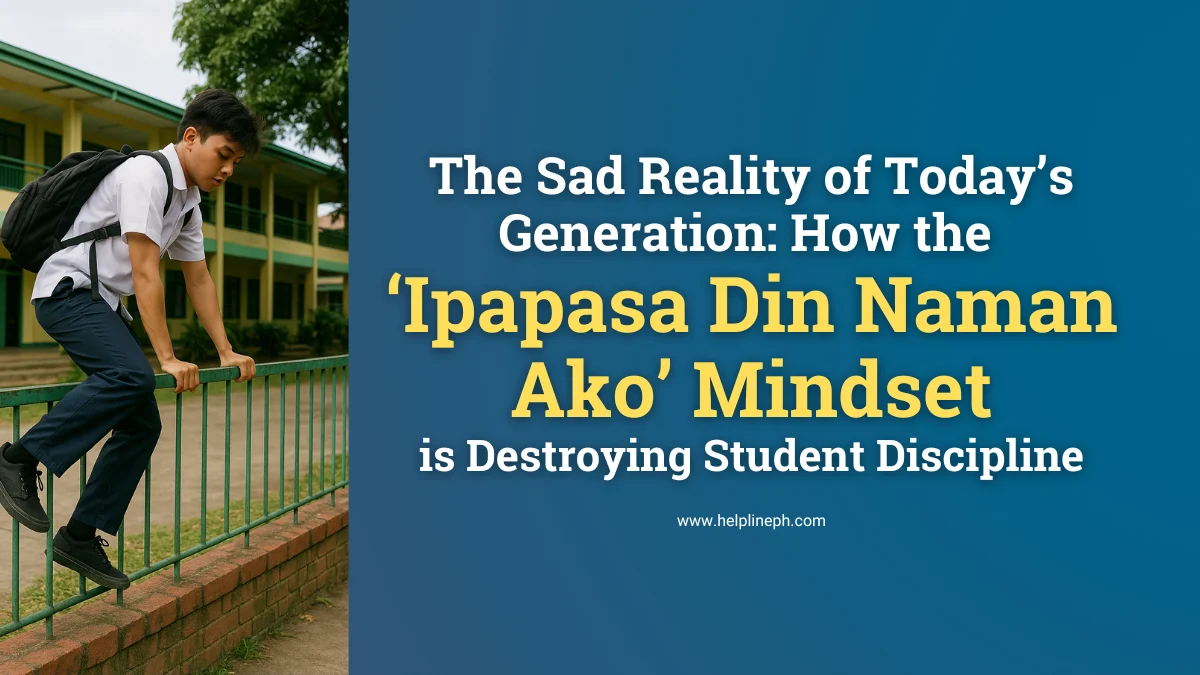The Ipapasa Din Naman Ako mindset has slowly become a common excuse among many students today. This belief—that they will be passed even without effort—creates a dangerous cycle of neglect and irresponsibility. Teachers extend deadlines, give second chances, and even personally remind students to complete their tasks, yet many still choose to ignore their responsibilities.
This is not just a problem about grades. It’s about discipline, values, and character. The sad reality is that if this mindset continues, we are raising a generation that believes in rewards without effort, success without hard work, and achievement without sacrifice.
As someone who has witnessed how students are given countless opportunities, I can’t help but feel both frustrated and hopeful. Frustrated, because so many are wasting their potential. Hopeful, because I know education still has the power to change lives—if only students take it seriously.
What Does the “Ipapasa Din Naman Ako” Mindset Mean?
The phrase “Ipapasa Din Naman Ako” literally means “I will be passed anyway.” It reflects the belief that:
- Teachers will always give passing marks, no matter what.
- Effort is not necessary, because leniency will save them.
- School is only about grades, not learning.
This mindset creates a culture of laziness in schools. Instead of striving for excellence, many students choose shortcuts. They skip assignments, delay requirements, and ignore responsibilities, thinking teachers will adjust for them in the end.
But here’s the truth: not every teacher will adjust forever. Eventually, students face the consequences of their actions—either through failing grades, lost opportunities, or regret later in life.
Why Is This Happening in Schools Today?
There are many reasons why this mindset is spreading:
- Too Much Leniency – Some students rely on teachers’ compassion. When teachers extend deadlines or give make-up work, students think they can always get away with slacking off.
- Peer Influence – When classmates adopt the same “chill” attitude, it spreads quickly. Students feel it’s normal to procrastinate.
- Lack of Accountability – Some parents or schools shield students from the consequences of failure, unintentionally encouraging irresponsibility.
- Focus on Passing, Not Learning – Many students see school as a requirement, not an opportunity. They only want to pass, not to gain real knowledge.
- Technology Distractions – Social media, games, and endless online entertainment often take priority over studying.
The Consequences of This Mindset
Believing in “Ipapasa Din Naman Ako” has serious long-term effects:
- Poor Work Habits – Students who don’t practice discipline in school struggle in college and work life.
- Lack of Resilience – When faced with real challenges, they give up easily because they never built endurance.
- Damaged Values – Hard work, honesty, and responsibility are replaced with entitlement and shortcuts.
- Missed Opportunities – Scholarships, career paths, and personal growth slip away because of wasted chances.
I’ve seen many former students regret their laziness once they stepped into the real world. Some wished they had listened when teachers reminded them. But by then, it was too late.
How Teachers Can Respond to This Mindset
Teachers often feel torn between compassion and discipline. On one hand, we understand the struggles students face—poverty, family problems, health issues, or even mental stress. On the other hand, if we keep tolerating irresponsibility, we fail to prepare them for the real world.
Here are some ways teachers can respond:
- Set Clear Standards
From the very beginning of the school year, rules must be clear. Students need to understand deadlines, grading policies, and expectations. When rules are consistent, students know they cannot simply rely on “Ipapasa Din Naman Ako.” - Balance Compassion with Accountability
Yes, we can extend deadlines for valid reasons. But we must also let students face the results of their choices when excuses become habitual. Compassion should not mean endless tolerance. - Teach the Value of Effort
Instead of focusing only on grades, teachers should highlight effort, persistence, and progress. Praise students who try, not only those who are naturally talented. - Give Real-Life Examples
Students need to hear stories of people who succeeded through hard work—and those who failed because of laziness. Real experiences stick more than lectures.
What Students Should Realize
To all students reading this: school is not just about passing. It’s about preparing for life. Every effort you make now is like planting seeds that will grow into your future.
- If you train yourself to always find excuses, you will carry that habit into your career.
- If you practice discipline and consistency, you will stand out in a world full of shortcuts.
- If you believe that “someone will save me,” you’ll struggle when no one is there to bail you out.
Ask yourself: What kind of future do you want? One built on hard work and self-respect, or one wasted because of laziness?
Building Discipline, Values, and Character
Education is more than memorizing facts. It is about shaping discipline, values, and character. Here’s how students can start:
- Practice Small Disciplines Daily
Submit work on time. Attend classes regularly. Start with small steps, because consistency builds character. - Stop Relying on Excuses
Life will always have distractions and problems. But excuses don’t produce results—effort does. - Respect Teachers’ Efforts
Teachers sacrifice their time to give extensions, reminders, and guidance. Don’t waste those efforts by ignoring responsibilities. - Think Long-Term
Every decision you make in school shapes your future. A missed assignment today may feel small, but habits of neglect can lead to bigger failures later.
A Message of Hope
Yes, it is frustrating to see students waste opportunities. But I also believe change is still possible. I have seen “lazy” students transform when they realized the value of discipline. I’ve seen failing learners rise to the top because they finally took responsibility.
It starts with a choice: Will you continue to say “Ipapasa Din Naman Ako” or will you prove that you deserve to pass through effort and growth?
The sad reality is painful to watch. But it doesn’t have to stay this way. Students still have the chance to rewrite their story—starting today.
Frequently Asked Questions (FAQs)
What does “Ipapasa Din Naman Ako” mean in English?
It means “I will be passed anyway.” It’s a mindset where students believe teachers will give them passing grades no matter what, even if they don’t exert effort.
Why is this mindset dangerous for students?
It destroys discipline, promotes laziness, and prevents students from developing values they need for future success.
What should teachers do about this?
Teachers must balance compassion with accountability—understanding students’ struggles but also making sure they face the results of irresponsibility.
How can students overcome this attitude?
By practicing discipline, respecting deadlines, valuing teachers’ efforts, and focusing on learning instead of just passing.
What’s the long-term effect of this mindset?
Students may face difficulties in college, work, and life because they are not used to effort, responsibility, and discipline.
The “Ipapasa Din Naman Ako mindset” is more than just a classroom problem—it’s a reflection of how many students view responsibility. The sad reality of today’s generation is that too many believe in success without effort. But this can change.
Education is not just about grades. It’s about building discipline, values, and character that will guide you for the rest of your life.
To every student reading this: your future is in your hands. Don’t waste the chances given to you. Every effort today is an investment in the person you will become tomorrow.






